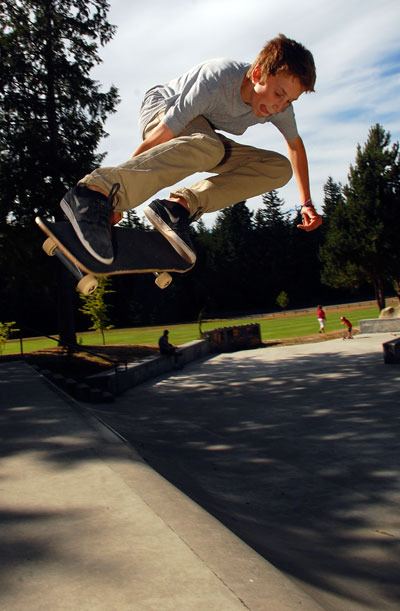A bid to lift a city-wide ban of skateboarding in Langley and allow the activity in residential areas nearly rolled to stop last week.
Following a string of concerns from the public at the City Council’s regularly scheduled meeting, the council appeared on the verge of scrubbing the proposal altogether for reasons largely related to safety.
A last minute recommendation from the crowd, however, swayed the council into agreeing to consider an alternative ordinance that outlines a temporary trial period and strongly encourages the use of helmets.
Langley Mayor Larry Kwarsick, a proponent of the original proposed rule changes, said in an interview Tuesday that he had no qualms with the council’s decision.
“I think it’s a good compromise,” Kwarsick said.
The proposal first went before the council earlier this month at the behest of Police Chief Randy Heston. He believes the current rules, which ban the use of skateboards, scooters, roller skates or any human-powered devices other than bicycles, are just too restrictive.
He proposed loosening the city’s regulations to allow such devices in residential neighborhoods around the city. They would still be restricted from commercial areas, such as downtown.
The proposal received a relatively positive reception during its first pass before the council as none voiced opposition to the proposal. Councilman Jim Sundberg even questioned why business zones were not also being included.
As Heston was not present to answer questions, the council agreed to table the issue until its next meeting. Council members Bruce Allen and Rene Neff were also out of town.
The following meeting saw much more debate and concern. Allen was particularly worried about the proposal, saying he’s seen skateboarders flying down city streets at “120 mph.”
“It’s not safe,” he said.
Neff voiced similar concerns. She said she recently watched a skateboarder riding down a Langley street at speeds that made her nervous.
“He was going like a bat out of hell,” she said.
However, she said she isn’t adamantly against skateboarding and asked whether the ordinance could be modified to require the use of helmets.
Heston said he didn’t think the city could go that far, that it’s a matter that would be better handled by parents. He did assure the council that the proposed ordinance changes are not a free license for dangerous behavior and that he would be keeping an eye on things.
Putting other people in danger would not be tolerated and would be met with swift action, he said. Police would be empowered to levy $80 citations and they wouldn’t be afraid to get out their pens.
“If they are skateboarding in a negligent manner, they are going to get some paperwork,” Heston said.
Several members of the audience also voiced concerns, repeating fears of safety on the part of the riders and the public. Others worried about potential property damage, such as dented cars.
The proposal wasn’t without public support, however. Second Street business owner Callahan McVay argued on behalf of the new rules, saying that skateboards are commonly used as a means of transportation.
He also said that today’s youths are a receptive group and would be willing to prove their responsibility with some self-policing, if given the chance. For those who might slip through the cracks, he encouraged critics to give them a friendly reminder.
“Shake your cane at them if you think they are going too fast,” McVay said.
Kwarsick also argued on behalf of Langley’s young people. He said this is a chance to show them that they matter, that city leaders care about their activities, their wants and their opinions.
“To the youth, this would signal we are an inclusive community,” Kwarsick said.
The council still wasn’t convinced. Allen said he believed the proposal needed more thought and that he would not be supporting it as is. Even Sundberg began to waiver from his earlier support, saying his initial enthusiasm had been tempered by community concern.
It appeared the measure was destined to fail until Langley resident Stephen Webber proposed a temporary trial period. Webber is new to town and has been attending council meetings on a regular basis.
The idea got traction from Neff and with Heston’s promise to include language that strongly encourages the use of helmets, the council unanimously agreed to consider a modified proposal and its next meeting.
Councilmen Hal Seligson and Doug Alldercie were not present at the meeting.
Kwarsick said later that the details have yet to be hammered out but that he is expecting to propose a trial period of between six months to one year. A six-month trial would be normal, but if it started immediately then it would include winter and that would not really be a fair test, he said.



